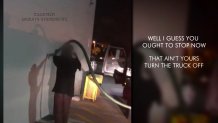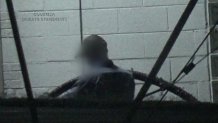It might be one of the most bizarre crimes ever, thieves stealing mass amounts of used cooking grease from restaurants, often in the dead of night.
It is a crime that seldom makes headlines but puts a real dent in the finances of rightful owners of used grease, with one estimate putting it at a $75 million loss each year.

In Texas, a group of retired homicide and narcotics detectives have banded together, informally known as the "grease police," to chase down thieves as they lurk behind restaurants, armed with big suction hoses dipped in oily goop.
So why would someone break the law for grease that may have been used to cook your last chicken dinner?
The answer is simple: In large amounts, the used cooking oil is sent to rendering plants to be converted into valuable biofuel.
Local
The latest news from around North Texas.
NBC 5 Investigates went along as the grease police tracked -- and recorded -- grease crooks at work, placing suction hoses into large containers of used restaurant oil and flipping the switch.
The grease police have video of surveillance outings -- one showing a thief cutting through a large container with a blow torch, another showing a pair struggling to tip and drain a heavy vat of oil.
"You better stop now ... that ain't yours," yelled one investigator, catching a thief in the act, his suction hose dipped inside a grease container.

In the past, The Texas Department of State Health Services regulated the rendering plants that processed the grease, and the trucks used to transport it, with a unit in place to go after thieves.
But in 2015, the state deregulated the industry, doing away with the unit and leaving it up to local law enforcement -- and the grease police -- to protect against thefts.
"Here he is right here. He's coming back out West Seventh," said Frank Scoggins, a member of the grease police, as he followed a suspected crook near downtown Fort Worth.
NBC 5 Investigates was with him, our cameras rolling.
"Man, they are tipping the container, so they can get every last drop," said one investigator, his camera trained on the criminal act.
In an interview, Scoggins said his team has caught numerous repeat offenders who, once out of jail, begin pumping more stolen grease out of restaurant containers.
"It's kind of like roaches, you know, they keep going and going and nothing keeps them from stealing except maybe being in jail," he said.
A possible deterrent to these crimes, Scoggins said, could come if the state would stiffen penalties, making any grease heist a felony, no matter the amount stolen, similar to what Texas did to combat rising thefts of certain metals.

The grease police work for Darling Ingredients, or Dar-Pro Solutions, an established grease disposal company, headquartered in Irving, that picks up and delivers used cooking oil to the company's rendering plants, located across the country.
A rising demand for biofuel has driven up the price of used grease -- and the incentive to steal it -- robbing restaurants of the money they could get for selling it. It also leaves cooks and waiters wary of who might be lurking outside the back door.
"We call them grease pirates, or oil pirates, that come in and pump our tanks when we're not watching," said Bill Ziegler, director of operations at Norma's Restaurants in North Texas.
Ziegler said he worries about staff coming face-to-face with someone caught stealing grease.

"You know … they're not the best guys in the world. So, it's kind of scary. I've got managers who confront them. I don't want that to happen. It's a little bit dangerous," he said.
Some grease theft rings appear to be operated by drug users tied to methamphetamine trafficking, Scoggins said.
He and his team should know -- most are former homicide and narcotic detectives from the Houston Police Department.
Scoggins' team can only shoot video and call for backup, hoping local police show up before someone has absconded with their oily loot.

But that's not always easy, especially in big cities like Dallas and Fort Worth where officers are busy on other calls and have little experience on how to deal with grease crimes, Scoggins said.
Their jobs were made even harder, he said, when in 2015 the state stopped enforcing rules designed to catch rouge rendering operators who buy stolen grease.
"This guy that we are after tonight, he would never be able to sell this stuff, he would never be able to get his vehicle passed an inspection, that would never float under the rules that they had," Scoggins said.
NBC 5 Investigates requested interviews with Sen. Jane Nelson (R), who represents parts of Tarrant and Denton counties, and Rep. Four Price (R) of Amarillo, the two state lawmakers who introduced legislation that deregulated the rendering industry four years ago.

Price, through a spokeswoman, declined to comment. Nelson was also unavailable, her staff telling NBC 5 Investigates "the senator has a full schedule" due to her legislative duties.
The senator's office said the legislation followed a recommendation from the state's Sunset Commission, which determined "rendering products are not intended for public consumption and therefore not a public health matter..."
"We thought, at the time I was in there, that it was a very important part of our job," said Clint Marable, a former inspector with the Department of State Health Services who helped guard against wrongdoings in the rendering business.
"In my opinion it needs to be back like it used to be, people checking on it," Marable said.

For now, however, it will be the grease police patrolling the streets, during hours when most of us are asleep, hoping to catch the people on the slippery side of the law.
"We will not give up," Scoggins vowed.



